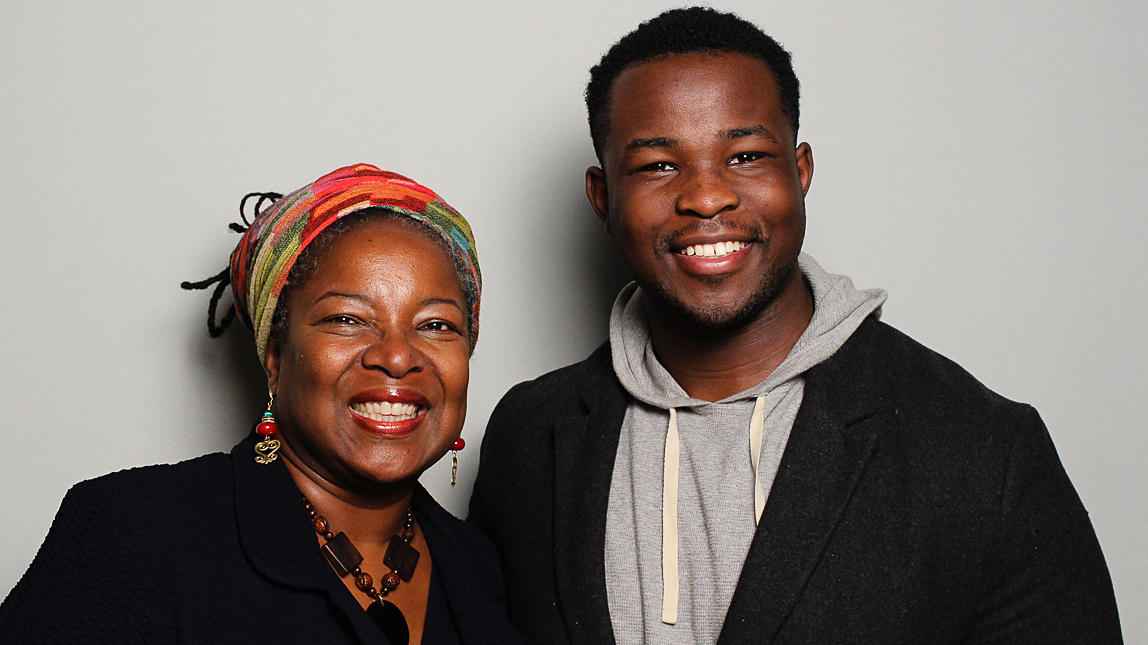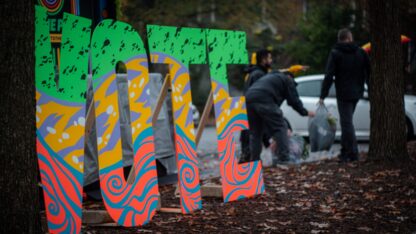A Grandson And Daughter Recall The Legacy Of An ‘Actual Superhero’

Toni Henson, 53, and her son, Camaran, 23, at StoryCorps in Atlanta.
StoryCorps
As a kid, Camaran Henson listened for hours as his grandfather, Leonard Simmons, told him stories about being a police officer in Newark, N.J.
Leonard Simmons died in 2013, but his stories live on through Camaran and his mom, Toni.
At StoryCorps in Atlanta, Toni tells Camaran about one that begins with her dad working in a factory — before he was a cop.
“He would get off work really late — past when the buses would run — so he would have to walk back home through Hillside. Hillside was majority white, and the cops used to stop him,” she says. “They would always ask the same question: ‘Where you going? Where you coming from?’ And that would make him angry. And I remember him saying, ‘One day, I’m going to own one of these houses in Hillside.’ So he joined the police force. And that was where I grew up.”
To Camaran, his grandfather was larger than life. “I really truly believed that Grandpa was bulletproof. Like my grandpa is an actual superhero and could probably fly,” he says.
Camaran asks his mother if she ever worried about him being a police officer.
“I never worried. He loved catching the bad guy. But one time, street informants told him there was going to be a robbery of a bar, so he and his partner walked in, and he actually was shot at and shot the perpetrator,” she says. “That was the only time that he killed a man. And he was hailed a hero, but I think he felt as though he failed. I remember hearing him weeping at night because he had taken someone’s life.”
That’s why he was such a good cop, she says. “He looked people in the eye and he saw them.”
What was he most proud of? Camaran asks.
“His kids,” she says. “He loved you, you know, first-born grandson.”
“I remember his wallet only held four pictures, and all four pictures were of me,” Camaran says.
On Saturday mornings, Camaran says, they would go to IHOP. “One particular time, one of the ladies next to me looked at me and picked her purse up and put it on the other side of her,” he says. “And Grandpa said, ‘You don’t have to move your purse. My grandson ain’t never stole nothing before in his life.’ And that meant the world to me. I still haven’t completely gotten over his passing.”
“I want you, Camaran, to know how much Grandpa loved you — but I don’t want you to ever feel like you’re off the hook,” she tells her son. “The legacy that you leave is the one that honors him.”
“Absolutely,” he says. “I try to be just like him, and I want him to continue to be proud of me.”
Audio produced for Morning Edition by Emily Martinez.
StoryCorps is a national nonprofit that gives people the chance to interview friends and loved ones about their lives. These conversations are archived at the American Folklife Center at the Library of Congress, allowing participants to leave a legacy for future generations. Learn more, including how to interview someone in your life, at StoryCorps.org.
9(MDEwMTk5OTQ0MDEzNDkxMDYyMDQ2MjdiMw004))
(SOUNDBITE OF MUSIC)
DAVID GREENE, HOST:
It is Friday, and that means StoryCorps. And for the family we’ll meet today, long conversations are something of a family tradition. As a kid, Camaran Henson listened for hours as his grandfather Leonard Simmons told him stories about being a police officer in Newark, N.J. Leonard died in 2013, but his stories are living on through Camaran and his mom Toni. At StoryCorps, Toni remembered how her father ended up on the force.
TONI HENSON: Dad was working in the factory, and he would get off work really late, past when the buses would run. So he would have to walk back home through Hillside. Hillside was majority white, and the cops used to stop him. They would always ask the same question – where you going? Where you coming from? – and that would make him angry. And I remember him saying – one day, I’m going to own one of these houses in Hillside. So he joined the police force, and that was where I grew up.
CAMARAN HENSON: I remember – I really, truly believed that Grandpa was bulletproof. Like, my grandpa’s an actual superhero…
T. HENSON: (Laughter).
C. HENSON: …And could probably fly.
Did you ever worry about Grandpa being a police officer?
T. HENSON: I never worried, you know. He loved catching a bad guy. But one time, street informants told him there was going to be a robbery of a bar. So he and his partner walked in, and he actually was shot at and shot the perpetrator. That was the only time that he killed a man – and he was hailed a hero. But I think he felt as though he failed. I remember hearing him weeping at night because he had taken someone’s life. That’s why he was such a good cop. He looked people in the eye, and he saw them.
C. HENSON: What would you say Grandpa was most proud of?
T. HENSON: His kids (laughter). He loved you, you know, first-born grandson.
C. HENSON: I remember his wallet only held four pictures, and all four pictures were of me. When Grandpa came to visit, I would put on my Timberlands just to make sure that he knew that I was getting taller.
T. HENSON: (Laughter) I didn’t know that.
C. HENSON: And Saturday mornings, he would take me to IHOP. One particular time, one of the ladies next to me looked at me and picked her purse up and put it on the other side of her. And Grandpa said, you don’t have to move your purse; my grandson ain’t never stole nothing before in his life. And that meant the world to me.
I still haven’t completely gotten over his passing.
T. HENSON: I want you, Camaran, to know how much Grandpa loved you. But I don’t want you to ever feel like you’re off the hook. The legacy that you leave is the one that honors him.
C. HENSON: Absolutely. I try to be just like him. And I want him to continue to be proud of me.
(SOUNDBITE OF BLUE DOT SESSIONS’ “GREY GREY JOE”)
GREENE: Camaran Henson with his mom Toni in Atlanta, Ga. Their conversation will be archived at the American Folklife Center in the Library of Congress and also featured on the StoryCorps podcast. Transcript provided by NPR, Copyright NPR.





